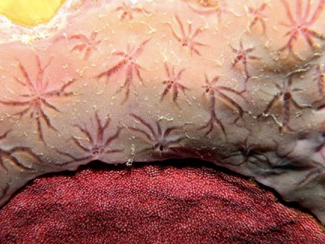Please note: Osher Rainforest will be closed for maintenance Jan. 14–16.
Science News
Sponge Heroes
October 11, 2013
by Molly Michelson

It’s easy to forget that sponges are animals. They don’t have faces. They don’t move. They don’t even have circulatory or digestive systems.
That’s Helen Field, describing these forgotten animals of the sea in ScienceNOW. Until last week, all sponges had going for them was the cartoon celebrity, SpongeBob SquarePants. (And although created by a marine biologist, SpongeBob isn’t exactly scientifically accurate.)
Now sponges are emerging as heroes to coral reef ecosystems—and they solve a 171-year mystery known as Darwin’s Paradox—according to Dutch researchers published in Science last week.
How can coral reefs, some of the most biodiverse ecosystems on the planet, exist in crystal clear waters with very few nutrients? Charles Darwin described this paradox in his early writings about coral reefs.
Sponges live in these reefs and are impressive filter feeders, chowing down on small life forms such as bacteria, planktonic algae, and even virus particles. The majority of their daily diet, however, consists of invisible dissolved organic substances that other reef organisms can’t catch, such as sugars.
Dutch researchers took this invisible sponge food source and marked it. They then traced it throughout the entire ecosystem and found that sponges took up the marked food and quickly turned it into detritus—in other words, sponge poop. This detritus then rains down on the reef where it forms an important food source for other reef inhabitants, including small crabs, snails. and worms. These small animals are eaten in turn by larger animals.
The team calls this the sponge loop, providing evidence that sponges form the base of a previously unknown pathway that plays a pivotal role in the food web of coral reef ecosystems.
The scientists say this sponge loop is so vital that it underscores the need to emphasize the role of sponges in future research and management of coral reefs. To date, the contribution of sponges has been severely undervalued, and they could be a key to saving our coral reefs, important socio-economic areas for tropical coastal areas..
So save the sponges, heroes of the coral reef!
Image: Benjamin Müller